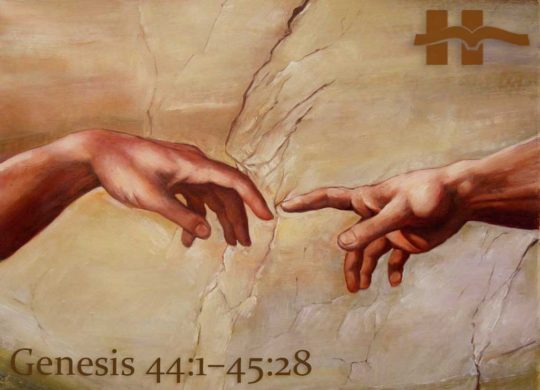Genesis 44:1–45:28

Self-sacrificial solidarity with the suffering, recognizing God’s overriding sovereignty, promotes divine blessing.
This section describes the remainder of the events on that fateful second trip to Egypt made by Joseph and his brothers. Benjamin had been brought along. Joseph, still incognito to his brothers, invites them to a grand feast and everything appears to be fine and dandy, at least till they get ready to return to Canaan.
Then comes the test that will reveal their repentant character and their changed colors: Joseph hides his goblet in Benjamin’s sack of food.
You see, the original crime against Joseph himself was that his half-brothers, working in solidarity, acted in hatred, vengeance, and greed, to inflict pain upon him, a son of Rachel. Had anything really changed? Had they come to terms with their father’s favoritism? Now will they take the food and the extra money, and run, abandoning Benjamin, another son of Rachel, forever?
Hey, here’s a great opportunity to get rid of another of Daddy’s favorites. Let’s just abandon this other parental pet and abscond. Good riddance!
But, no! When the cup is discovered in Benjamin’s sack, together they rend their clothes in a sign of powerful solidarity with the young one, and return to Joseph’s house without a moment’s hesitation, without a single recorded word (44:13), this even after having been told firmly that the innocent would be released and only the guilty would be detained (44:10). The innocent willing to suffer with one ostensibly guilty, all for the sake of family. Collective responsibility—they act as one! Finally, they show themselves to be their brother’s keepers. Amazing!
But Joseph doesn’t let them off the hook (44:15, 17). Because there is one more question to be answered: Has their earlier cavalier and callous attitude to their aging father changed? And so he insists that Benjamin stay back enslaved; the rest of them could return (44:17).
And then Judah speaks. What a speech! Declared one scholar: “No more moving example of true contrition and repentance is to be found in Scripture, unless it be the parable of the prodigal son (Luke 15).”
As he had promised his father in 43:9, Judah places his own life on the line (44:32–34). What is striking is that this act of sacrifice is not primarily being for Benjamin, but for the sake of an already wounded and deeply hurting father: Judah uses “father” fourteen times in his speech to Joseph (44:16, 18–34). The gist of Judah’s speech is that his father has lost one of his favorite sons already and they—Judah and his brothers—are not willing to put Jacob through another similar loss, the shock of which might well kill him. Judah concludes by asserting that he, Judah, will take the place of Benjamin (44:33–34). He is willing to forsake his very life, rather than put his father through the agony of another “bereavement” (42:36). And this, despite the fact that father Jacob, loves him, Judah, and his brothers less than he does the two favorites of his (37:3; 42:4, 36, 38). Judah is a broken man, well aware of his own guilt and his own burdens of responsibility. Even Joseph did not have to suffer the particular emotional upheavals that Judah experienced over the years. Judah is a strong competitor with Joseph to be the hero of this saga.
That Judah should adduce the father’s favoritism as the ground for self-sacrifice is such an irresistible proof of filial devotion that it breaks down Joseph’s last defenses. Joseph weeps!
With Judah’s self-denial, bonds are broken, reconciliation is achieved, relationships are restored—the blessing of God is experienced by one and all. The abundance of divine blessing is unprecedented: the entire family is reunited, and all seventy of them relocate to Egypt where they live in comfort. All because of Judah’s self-denying sacrifice, for a brother more loved than himself!











 Abe Kuruvilla is the Carl E. Bates Professor of Christian Preaching at The Southern Baptist Theological Seminary (Louisville, KY), and a dermatologist in private practice. His passion is to explore, explain, and exemplify preaching.
Abe Kuruvilla is the Carl E. Bates Professor of Christian Preaching at The Southern Baptist Theological Seminary (Louisville, KY), and a dermatologist in private practice. His passion is to explore, explain, and exemplify preaching.